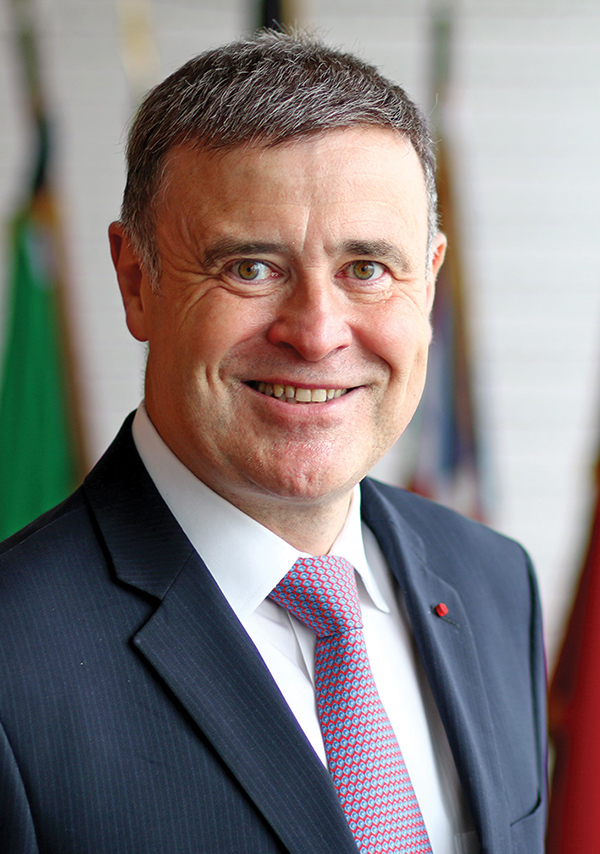The European Approach to Management
A pan-European school that stands for academic excellence and singularity, creativity and pluralism
With six campuses in Madrid, Turin, Warsaw, Berlin, London and Paris, multi-accredited ESCP is the continent’s oldest business school and the only one that is truly pan-European. “We are a leader in the sector because we know how to mix cultural pluralism and interdisciplinarity to help students develop a better understanding of global issues,” says Frank Bournois, the school’s dean and executive president.
“Our mission is to educate students with a European approach, in which business, society and politics are intertwined, which essentially is what foreign policy is about, and we teach unique programs in intercultural management.” Providing a full portfolio of programs — including bachelors, master’s, MBAs, PhDs and executive education — to participants from 120 countries, ESCP utilizes a specific ‘PHYGITAL’ model for its teaching, so that all students engage in both face-to-face and online education.
“We know how to mix cultural pluralism and interdisciplinarity to help students develop a better understanding of global issues.”
“We have encouraged and fostered digital transformation, and invested a lot in our ‘PHYGITAL’ factory, which supports our faculty to create digital modules for companies and digital education. However, we don’t believe in an entirely digital offer for education in management. Our goal is a minimum of 20% digital classes and a minimum of 40% physical classes. They go together and physical education remains one of the key values of learning on our campuses,” Bournois states.
Sustainability is fundamental
Through its network of 65,000 alumni in over 150 countries plus worldwide academic and research alliances, ESCP has an impressive international footprint and continues to meet its vision of educating the world’s future leaders with skills they will need.
According to Bournois: “A very important topic at the moment is environmental societal governance. Students want more than just lessons and talks about sustainability. This is why we have an associate dean for sustainability and the circular economy. Sustainability is not just a course or an elective, it covers anything we teach. It’s fundamental that we train future leaders for these challenges. We train them alongside companies, for example, we have a special chair in the circular economy working with Deloitte and other advisory firms.”
In this, as in all its activities, the school shows the values behind its name, he states: “ESCP stands for academic excellence and singularity: meaning students must learn physically and digitally; creativity: as the school has always created; and pluralism: meaning the variety of the European community.”
Pan-European Approach Intertwines Business, Society and Politics
A conversation with Frank Bournois, Dean and Executive President of the only pan-European specialist: ESCP Business School

Could you sum up the essence of ESCP Business School?
ESCP is a European leader in the area of business schools, because we know how to mix cultural pluralism and interdisciplinarity to help students develop a better understanding of global issues. Our mission is to educate students with a European approach, in which business, society and politics are intertwined, which essentially is what foreign policy is about. We do it with a very specific ‘PHYGITAL’ model: physical and digital. We currently have six campuses in Europe and teach students with unique programs in intercultural management.
As Europe’s oldest business school, ESCP celebrated 200 years of history in 2019. How would you characterize ESCP’s experience during the pandemic that hit the world the following year?
We are the only true pan-European business school, with campuses in Madrid, Turin, Warsaw, Berlin, London and Paris. ESCP stands for academic excellence and singularity: meaning students must learn physically and digitally on all campuses; creativity: as the school has always created; and pluralism: meaning the variety of the European community.
During the pandemic, the school immediately adapted to digital teaching. Then, we invested a lot in a ‘PHYGITAL’ factory, which is supporting the faculty to also create digital modules for companies and digital education. We encouraged and fostered digital transformation.
However, we don’t believe in an entirely digital offer for education in management. We are using digital technology to innovate in pedagogy and we think that it is very good, but our goal is having a minimum of 20% digital classes and a minimum of 40% physical classes. They go together and physical education remains one of the key values of learning on our different campuses with faculty and business leaders.
Corporations are increasingly valued for their contributions to social development and global sustainability. What is ESCP’s strategy for producing leaders with these skills?
ESCP’s vision is about educating future leaders regarding the European approach of management. A very important topic at the moment is the Environmental Societal Governance approach and there are students who are really committed to sustainability: they want to see more in their school than just lessons and talks about sustainability. This is why we have an associate dean for sustainability and the circular economy.
Sustainability is not just a course or an elective, it covers anything that we teach. This is fundamental; that we train the future leaders for these challenges. We train them alongside companies, which themselves are also very committed in that regard. In the circular economy, we have a special chair working in this way with Deloitte and other advisory firms.
How strong is ESCP’s wider international network outside Europe?
Our school has developed remarkable partnerships. We work with many people around Europe but also have strategic partnerships on several other continents. In Asia, we work with four important institutions, including the China European and International Business School. In North America, we are very connected with Cornell University, Massachusetts Institute of Technology and the University of Texas at Austin.
We don’t want to have too many partnerships, but we want to have the best possible ones with people that share common values with us. We remain very European. In Europe, we are at home and we run our own campuses. On other continents, we have best partnerships.
European Business Schools for the Future Contents:

 Download the PDF
Download the PDF